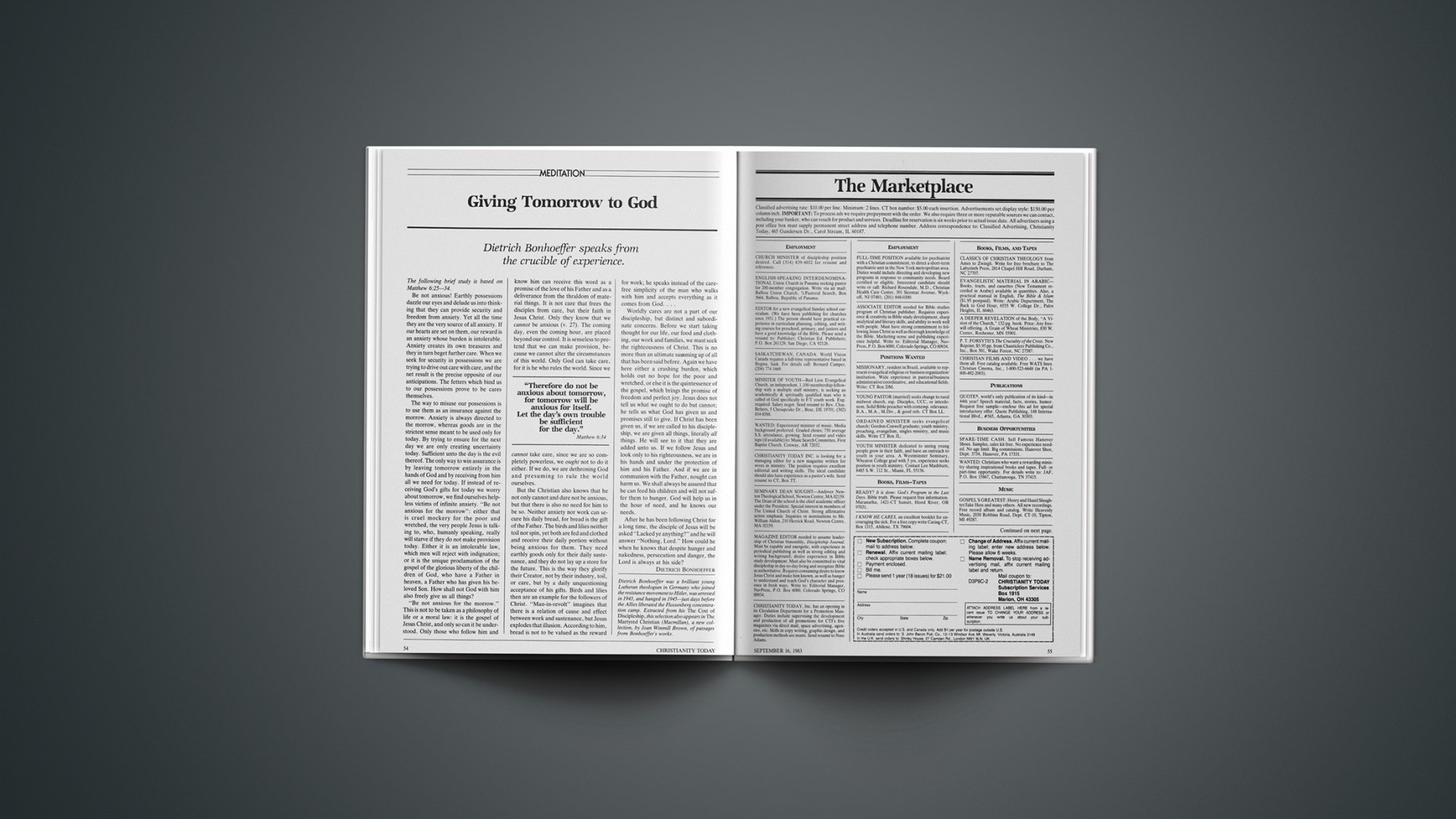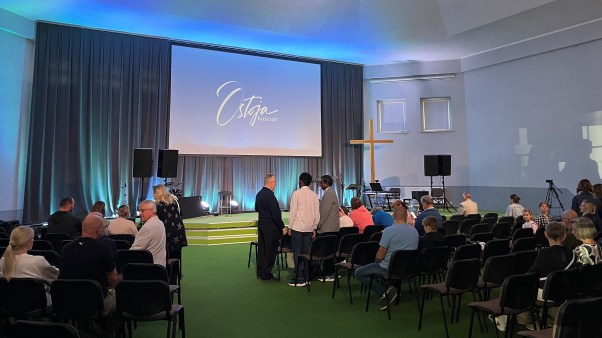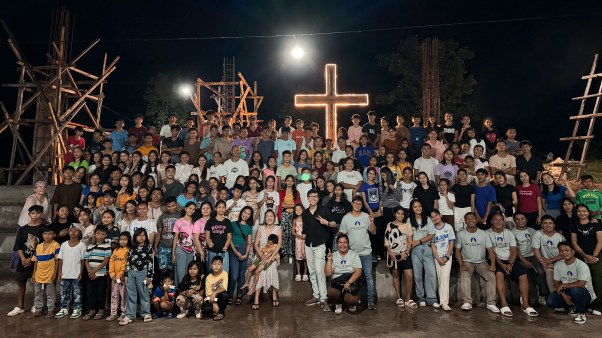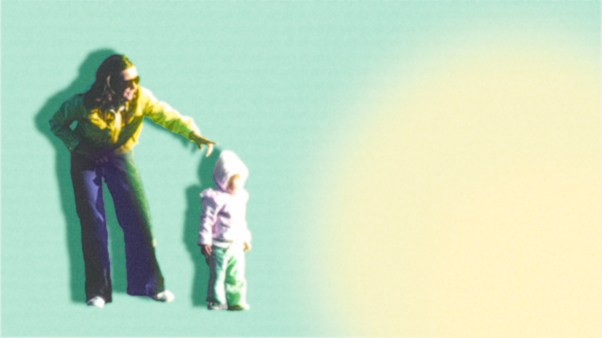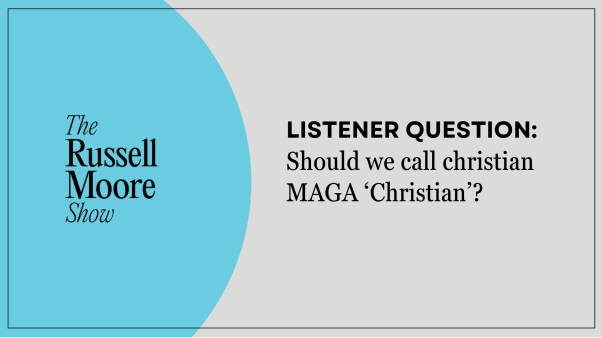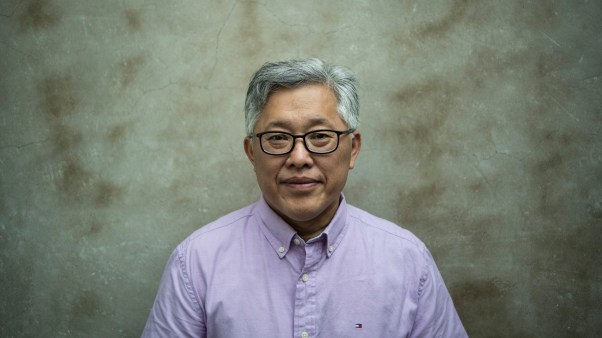Dietrich Bonhoeffer speaks from the crucible of experience.
The following brief study is based on Matthew 6:25–34.
Be not anxious! Earthly possessions dazzle our eyes and delude us into thinking that they can provide security and freedom from anxiety. Yet all the time they are the very source of all anxiety. If our hearts are set on them, our reward is an anxiety whose burden is intolerable. Anxiety creates its own treasures and they in turn beget further care. When we seek for security in possessions we are trying to drive out care with care, and the net result is the precise opposite of our anticipations. The fetters which bind us to our possessions prove to be cares themselves.
The way to misuse our possessions is to use them as an insurance against the morrow. Anxiety is always directed to the morrow, whereas goods are in the strictest sense meant to be used only for today. By trying to ensure for the next day we are only creating uncertainty today. Sufficient unto the day is the evil thereof. The only way to win assurance is by leaving tomorrow entirely in the hands of God and by receiving from him all we need for today. If instead of receiving God’s gifts for today we worry about tomorrow, we find ourselves helpless victims of infinite anxiety. “Be not anxious for the morrow”: either that is cruel mockery for the poor and wretched, the very people Jesus is talking to, who, humanly speaking, really will starve if they do not make provision today. Either it is an intolerable law, which men will reject with indignation; or it is the unique proclamation of the gospel of the glorious liberty of the children of God, who have a Father in heaven, a Father who has given his beloved Son. How shall not God with him also freely give us all things?
“Be not anxious for the morrow.” This is not to be taken as a philosophy of life or a moral law: it is the gospel of Jesus Christ, and only so can it be understood. Only those who follow him and know him can receive this word as a promise of the love of his Father and as a deliverance from the thraldom of material things. It is not care that frees the disciples from care, but their faith in Jesus Christ. Only they know that we cannot be anxious (v. 27). The coming day, even the coming hour, are placed beyond our control. It is senseless to pretend that we can make provision, because we cannot alter the circumstances of this world. Only God can take care, for it is he who rules the world. Since we cannot take care, since we are so completely powerless, we ought not to do it either. If we do, we are dethroning God and presuming to rule the world ourselves.
But the Christian also knows that he not only cannot and dare not be anxious, but that there is also no need for him to be so. Neither anxiety nor work can secure his daily bread, for bread is the gift of the Father. The birds and lilies neither toil nor spin, yet both are fed and clothed and receive their daily portion without being anxious for them. They need earthly goods only for their daily sustenance, and they do not lay up a store for the future. This is the way they glorify their Creator, not by their industry, toil, or care, but by a daily unquestioning acceptance of his gifts. Birds and lilies then are an example for the followers of Christ. “Man-in-revolt” imagines that there is a relation of cause and effect between work and sustenance, but Jesus explodes that illusion. According to him, bread is not to be valued as the reward for work; he speaks instead of the carefree simplicity of the man who walks with him and accepts everything as it comes from God.…
Worldly cares are not a part of our discipleship, but distinct and subordinate concerns. Before we start taking thought for our life, our food and clothing, our work and families, we must seek the righteousness of Christ. This is no more than an ultimate summing up of all that has been said before. Again we have here either a crushing burden, which holds out no hope for the poor and wretched, or else it is the quintessence of the gospel, which brings the promise of freedom and perfect joy. Jesus does not tell us what we ought to do but cannot; he tells us what God has given us and promises still to give. If Christ has been given us, if we are called to his discipleship, we are given all things, literally all things. He will see to it that they are added unto us. If we follow Jesus and look only to his righteousness, we are in his hands and under the protection of him and his Father. And if we are in communion with the Father, nought can harm us. We shall always be assured that he can feed his children and will not suffer them to hunger. God will help us in the hour of need, and he knows our needs.
After he has been following Christ for a long time, the disciple of Jesus will be asked “Lacked ye anything?” and he will answer “Nothing, Lord.” How could he when he knows that despite hunger and nakedness, persecution and danger, the Lord is always at his side?
DIETRICH BONHOEFFER1Dietrich Bonhoeffer was a brilliant young Lutheran theologian in Germany who joined the resistance movement to Hitler, was arrested in 1943, and hanged in 1945—just days before the Allies liberated the Flossenberg concentration camp. Extracted from his The Cost of Discipleship, this selection also appears in The Martyred Christian (Macmillan), a new collection, by Joan Winmill Brown, of passages from Bonhoeffer’s works.

